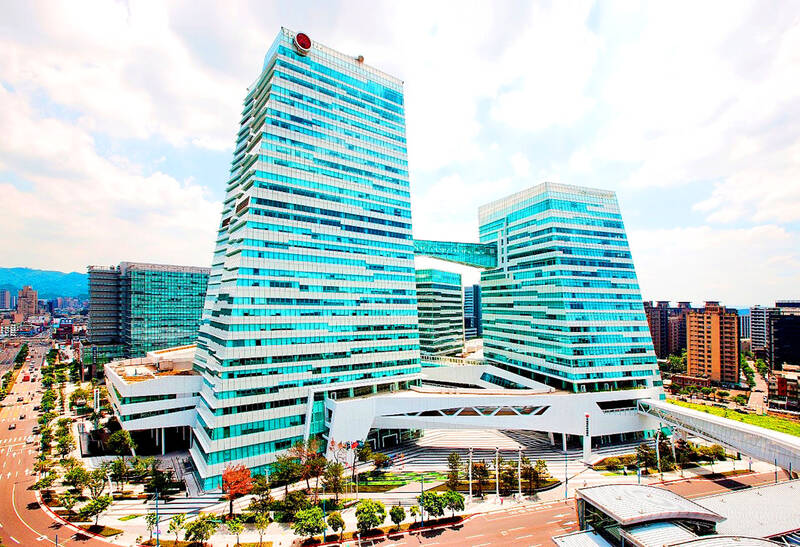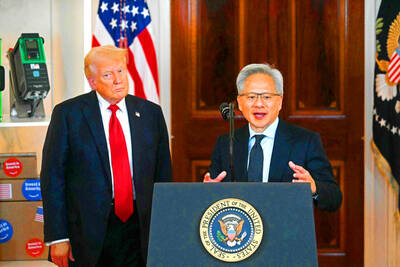CTBC Financial Holding Co (中信金控) announced on Monday that the Dow Jones Sustainability Indices (DJSI) have selected the company as a component of the DJSI World Index for the fifth consecutive year and have for the ninth straight year listed it on the DJSI Emerging Markets Index, as the company leads the industry in climate strategy, sustainable finance, inclusive finance and human capital management.
The company’s sustainability report and information disclosure also won plaudits for transparency.
As a pioneer in sustainable finance in Taiwan, CTBC Financial has incorporated net zero emissions by 2050 into its sustainable development blueprint, and the science-based targets it submitted have passed the Science Based Targets initiative’s review, covering the overseas branches of CTBC Bank (中信銀行), as well as the investment and financing assets of its subsidiaries in the US, Canada, Japan, the Philippines and Indonesia.

Photo courtesy of CTBC Financial Holding Co
In addition, CTBC Bank continues to deepen the connection between its financial business and sustainable development. Last year, its balance for sustainable financing exceeded NT$277.3 billion, accounting for 20 percent of its total loan balance.
CTBC Financial said it has long-term investments in offshore wind power and solar photovoltaic projects to support the development of renewable energy in the country. This year, the company quantified renewable energy investments in accordance with the Global Impact Investing Network’s “IRIS+ Impact Metrics,” which has a positive impact on the environment. Last year, the company’s renewable energy projects produced more than 740 million kilowatt-hours of electricity, with emission reductions cutting social cost losses by NT$2.1 billion.
In April, CTBC Financial issued a statement on inclusive finance, providing financial products and services that are inclusive, accessible and innovative for different groups, as well as making good use of the company’s core business and public welfare strategies to implement inclusive finance.
For financial services for elderly people, CTBC Bank has set up senior citizen counters in its branches, and Taiwan Life Insurance Co (台灣人壽) has provided thoughtful services, such as a senior service hotline, coupled with anti-fraud mechanisms to make the assets of elderly customers more secure.
To familiarize children with the concepts of financial management as early as possible, CTBC Bank launched a parent-child financial service “Money Savings Diary” to encourage parents and children to save together.
It also formed a team of financial management volunteers to tour rural areas. Last year, the bank provided 76 courses to help disadvantaged families and children establish financial management awareness and debt management concepts.
CTBC Financial deems talent as the key capital for the sustainable development of the company, actively develops a diversified talent training mechanism, provides training resources and learning environment, and builds a maternal care and family support mechanism that is better than that required by law.
This year, the company launched fully paid childcare leave to encourage employees to participate in their children’s school activities, which helped it win the “Best Corporate Employer in Asia” award from “HR Asia” for the seventh consecutive year.
Meanwhile, CTBC Financial actively implements low-carbon transformation and continues to serve as the Asia-Pacific chair of the Partnership for Carbon Accounting Financials, guiding our peers in the financial industry to co-create a sustainable financing ecosystem.
The company’s “2023 Sustainability Report” is calculated and disclosed based on international standards and methodologies, and its transparency and trustworthiness comply with international standards.
CTBC Financial has also implemented carbon emission information disclosure, a carbon reduction target commitment and an emissions reduction plan formulation. Being selected for the “Top 100 Carbon Competitiveness” by Business Weekly for three consecutive years highlights CTBC Financial’s ongoing efforts in addressing climate issues.

Taiwan Semiconductor Manufacturing Co (TSMC, 台積電) last week recorded an increase in the number of shareholders to the highest in almost eight months, despite its share price falling 3.38 percent from the previous week, Taiwan Stock Exchange data released on Saturday showed. As of Friday, TSMC had 1.88 million shareholders, the most since the week of April 25 and an increase of 31,870 from the previous week, the data showed. The number of shareholders jumped despite a drop of NT$50 (US$1.59), or 3.38 percent, in TSMC’s share price from a week earlier to NT$1,430, as investors took profits from their earlier gains

AI TALENT: No financial details were released about the deal, in which top Groq executives, including its CEO, would join Nvidia to help advance the technology Nvidia Corp has agreed to a licensing deal with artificial intelligence (AI) start-up Groq, furthering its investments in companies connected to the AI boom and gaining the right to add a new type of technology to its products. The world’s largest publicly traded company has paid for the right to use Groq’s technology and is to integrate its chip design into future products. Some of the start-up’s executives are leaving to join Nvidia to help with that effort, the companies said. Groq would continue as an independent company with a new chief executive, it said on Wednesday in a post on its Web

CHINA RIVAL: The chips are positioned to compete with Nvidia’s Hopper and Blackwell products and would enable clusters connecting more than 100,000 chips Moore Threads Technology Co (摩爾線程) introduced a new generation of chips aimed at reducing artificial intelligence (AI) developers’ dependence on Nvidia Corp’s hardware, just weeks after pulling off one of the most successful Chinese initial public offerings (IPOs) in years. “These products will significantly enhance world-class computing speed and capabilities that all developers aspire to,” Moore Threads CEO Zhang Jianzhong (張建中), a former Nvidia executive, said on Saturday at a company event in Beijing. “We hope they can meet the needs of more developers in China so that you no longer need to wait for advanced foreign products.” Chinese chipmakers are in

POLICY REVERSAL: The decision to allow sales of Nvidia’s H200 chips to China came after years of tightening controls and has drawn objections among some Republicans US House Republicans are calling for arms-sale-style congressional oversight of artificial intelligence (AI) chip exports as US President Donald Trump’s administration moves to approve licenses for Nvidia Corp to ship its H200 processor to China. US Representative Brian Mast, the Republican chairman of the US House Committee on Foreign Affairs, which oversees export controls, on Friday introduced a bill dubbed the AI Overwatch Act that would require the US Congress to be notified of AI chips sales to adversaries. Any processors equal to or higher in capabilities than Nvidia’s H20 would be subject to oversight, the draft bill says. Lawmakers would have